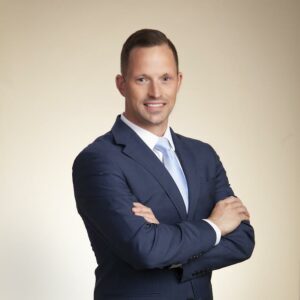Chris Gray
Chief technology officer, RENU Communities
Age: 36
Industry experience: 16 years
Chris Gray looks at commercial properties through an energy efficiency lens to help Boston-based Taurus Investment Holdings evaluate potential acquisitions. As chief technology officer of RENU Communities, Gray is leading upgrades to install on-site renewable energy and new building systems at a pair of Taurus’ existing properties: a large office building in Concord and apartment complex in Fall River. The projects are expected to reduce carbon dioxide emissions by a combined 9,649 tons annually. Before joining RENU, Gray was an executive at Atlanta-based gas and utility holding company Southern Co., where he vetted new building business plans.
Q: What made Taurus’ 300 Baker Ave. property in Concord a good candidate for energy retrofits?
A: That property was of interest to RENU because of the age of the mechanical systems. It’s a large [417,000-square-foot] property with primarily original HVAC equipment, which means that there’s opportunities for improvement. The large building means there’s a large opportunity to make an impact. The older mechanical systems are going to be replaced eventually, and so if you take a holistic look at the buildings, you take the opportunity to do that in a planned, methodical way. You can make the best decisions to upgrade. You combine those mechanical systems [upgrades] with the large open areas and the large flat roof that lends itself to solar photovoltaic arrays, and you can make some real impacts on energy efficiency.
The idea really evolved from our flagship property in Fall River, where we’re doing a complete renovation of a multifamily property. It’s a 1970s-vintage property with very inefficient HVAC systems, and we’re doing an in-depth retrofit where we upgrade the windows and sliding doors, the insulation and the attic fans and replace every HVAC system through the entire property with advanced heat pumps, and applying solar [panel arrays] to every building. That will reduce baseline energy usage by 80 percent.
Q: What is the business case for energy retrofits?
A: Historically, the issue with energy efficiency in real estate investment is there’s this view that there’s no incentive for the landlord to invest in efficiency, because the bills are ultimately passed onto the tenant. That’s not true. The landlord is responsible for maintaining the equipment and keeping the property affordable for the tenants. There’s an incentive for the landlord to invest in efficiency. And they are creating efficiencies for themselves through operational upgrades, and reducing their exposure for capital upgrades. If you do it all at once, you can plan when you spend that money, and that next person who buys the real estate investment knows they are not going to have to, so the value is greater.
Q: What’s the target savings for a typical property?
A: The annual operating savings are different for every property. In every project, we look for incremental improvement in net operating income. We do our retrofits as a for-profit exercise for Taurus. We are right in the middle of the retrofits at South Winds, replacing the HVAC and doing the solar installation and we anticipate that project will be complete by the end of next year. We anticipate starting construction at 300 Baker Ave. in mid-2022. We’re in the middle of design and filing paperwork with the utilities for battery storage and renewable energy interconnection.
Q: How do recent regulatory changes such as Boston’s updated BERDO (Building Energy Reduction and Disclosure Ordinance) affect landlords’ decisions on retrofits or new building designs?
A: You can take what’s happening with the city of Boston as an example of what’s going to happen around the country. It’s going to require companies to have groups like RENU that help implement these retrofits in order to maintain their compliance with BERDO or whatever standard a particular city uses. That might be an internal group of an outside entity, but it’s quickly going to be a requirement of every real estate investor to have a group evaluating this. We review every property that Taurus looks at purchasing and we have multiple projects in the pipeline in the Orlando area and Phoenix.
Q: What discourages developers of new properties from designing them with carbon-cutting utilities such as all-electric heating and cooling?
A: No single solution works everywhere. Buildings are built differently and you have to take a bespoke look at every building. We know HVAC and mechanical systems use a huge portion of energy in buildings. We know water heaters use a large portion. A heat pump pushes heat from one location to another. You can use that same technology and put it into a tank for water heating. Lighting technologies are a large portion of energy consumption in commercial buildings, and we have LED technologies that can reduce consumption. When you combine those technologies with renewable energy, you can make significant impacts to the energy consumption at surprisingly reasonable costs.
Gray’s Five Favorite Bourbons
- Boone County Eighteen33 12-year Single Barrel
- E.H. Taylor, Jr. Barrel Proof
- Elmer T. Lee Single Barrel
- Weller Antique
- Woodford Reserve






